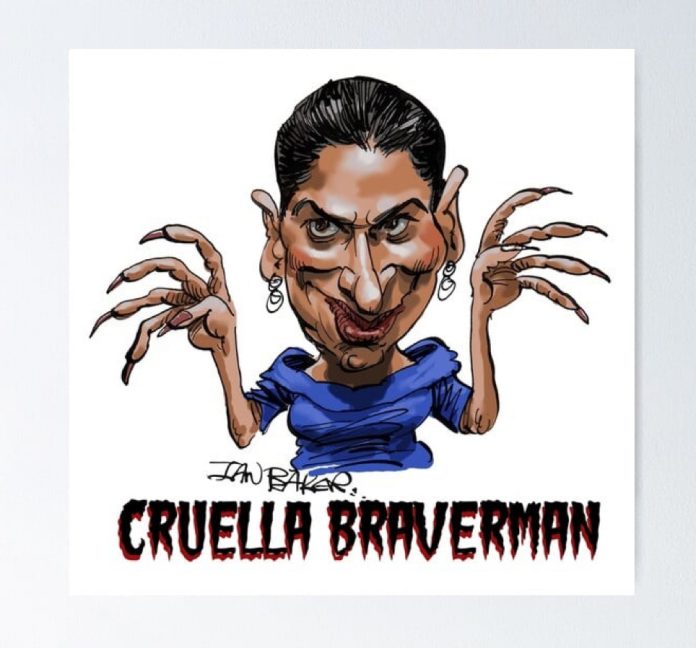Suella Braverman, has garnered significant attention for her hardline stances and controversial policies. While her supporters laud her for her uncompromising approach to law and order, immigration, and national security, critics argue that her policies often reveal a “nasty” side characterised by insensitivity, harshness, and a disregard for human rights.
One of the most contentious areas of Braverman’s tenure as Home Secretary was her approach to immigration. She has been a vocal advocate for reducing immigration numbers and implementing stricter controls through means that fail to deal with the causes and only address the symptoms. There is no mention of selling arms to regimes that murder and intimidate their population. There is no mention of the imperialism imposed upon many millions of people against their will. No, just attack the victims. Under her leadership, the UK has seen the introduction of policies that many argue are draconian and inhumane. For instance, the proposal to send asylum seekers to Rwanda has been widely condemned by human rights organisations. Critics argue that this policy not only undermines the rights of refugees but also sets a dangerous precedent in the treatment of asylum seekers. The United Nations Refugee Agency (UNHCR) has expressed deep concerns about the legality and morality of such a policy, highlighting the potential for significant human suffering and breaches of international law.
Braverman’s handling of the Windrush scandal further underscored the “nasty” side of her political stance. The scandal, which involved the wrongful detention, deportation, and denial of legal rights to members of the Windrush generation, brought to light the severe flaws in the UK’s immigration system. Despite widespread outrage and calls for justice, Braverman’s response has been criticised as inadequate and dismissive. The compensation scheme set up to address the injustices faced by the Windrush generation has been plagued by delays and bureaucracy, leading many victims to feel that the government is not genuinely committed to rectifying the wrongs committed.
Braverman’s approach to law and order has also been a source of significant criticism. Her advocacy for increasing police powers, including the controversial use of stop-and-search tactics, has raised concerns about racial profiling and civil liberties. These policies disproportionately affect minority communities, exacerbating existing tensions and mistrust between the police and the public. Furthermore, her support for stricter sentencing and the expansion of prison capacities reflects a punitive rather than rehabilitative approach to criminal justice, which many experts argue is ineffective in reducing crime and rehabilitating offenders.
Braverman’s stance on human rights issues has often been perceived as dismissive and antagonistic. She has been a vocal critic of the European Convention on Human Rights (ECHR) and has expressed a desire for the UK to distance itself from its obligations under the convention. This position has alarmed human rights advocates, who warn that such a move would undermine fundamental rights and freedoms in the UK. Her rhetoric often frames human rights as obstacles to effective governance rather than essential protections for individuals, revealing a troubling disregard for the principles of justice and equality.
A surprising but perceptive interview by Nick Robinson sums up Suella Braverman’s cruelty to her face:
Nick Robinson sums up Suella Braverman. pic.twitter.com/I3UHqhEdmQ
— BladeoftheSun (@BladeoftheS) June 10, 2024
KEEP US ALIVE and join us in helping to bring reality and decency back by SUBSCRIBING to our Youtube channel: https://www.youtube.com/channel/UCQ1Ll1ylCg8U19AhNl-NoTg AND SUPPORTING US where you can: Award Winning Independent Citizen Media Needs Your Help. PLEASE SUPPORT US FOR JUST £2 A MONTH https://dorseteye.com/donate/







